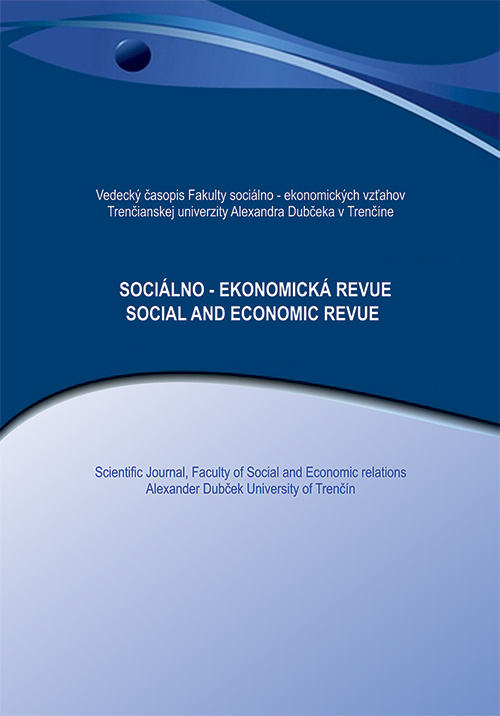MODERN HR APPROACHES IN RELATION TO THE FINANCIAL PERFORMANCE OF SMES
Small and medium-sized enterprises (SMEs) are key drivers of wealth creation and employment across economies. In today’s increasingly dynamic and uncertain business environment, SMEs must adopt modern human resource management systems to enhance financial performance and gain a competitive edge. This study explores the relationship between High Performance Work Systems (HPWS) and organizational financial performance (FP), with a specific focus on empirically validating mediating effects through a rigorous model comparison approach to strengthen the robustness of the findings. Beyond assessing the direct relationship between HPWS and FP, the study investigates the mediating roles of SME reputation (RE) and SME social value (SV). The primary objective is to quantify these relationships within the context of human resource management practices in Slovak SMEs. Data were gathered via a survey of 300 SME owners and managers. Partial least squares structural equation modelling (PLS-SEM), implemented using SmartPLS 4, was used to test the proposed hypotheses. The findings reveal a significant positive effect of HPWS on all three constructs—RE, SV, and FP. Furthermore, the study confirms that RE significantly mediates the relationship between HPWS and FP. However, the hypothesized mediating effect of SV between HPWS and FP was not supported.
Vydanie: 2025/1 Strany: 5-17 Klasifikácia JEL: C31, C83, O30
DOI: https://doi.org/10.52665/ser20250101
Kľúčové slová: High Performance Work Systems (HPWS), financial performance, small and medium-sized enterprises (SMEs), corporate reputation, social value, human resource management, PLS-SEM
Sekcia:
Kontakty:
Dana Jašková, RNDr., PhD.
Alexander Dubček University of Trenčín
Faculty of Social and Economic Relations
Študentská 3, 911 50 Trenčín
Email: dana.jaskova@tnuni.sk
Literatúra:
Alpkan, L., Yilmaz, C., Kaya, N. (2007). Market Orientation and Planning Flexibility in SMEs: Performance Implications and an Empirical Investigation. International Small Business Journal, 25(2), 152–172. https://doi.org/https://doi.org/10.1177/0266242607074518
Anggadwita, G., Mustafid, Q. Y. (2014). Identification of Factors Influencing the Performance of Small Medium Enterprises (SMEs). Procedia - Social and Behavioral Sciences, 115, 415–423.
Auerswald, P. E. (2009). Creating social value [Working paper]. Social Science Research Network.
Baeshen, Y., Soomro, Dr. Y., Bhutto, M. (2021). Determinants of Green Innovation to Achieve Sustainable Business Performance: Evidence From SMEs. Frontiers in Psychology, 12.
Boon, C., Den Hartog, D. N., Lepak, D. (2019). A systematic review of Human Resource Management Systems and their Measurement’. In Journal of Management, 45, 2498–537. https://doi.org/10.1177/0149206318818718
Brammer, S., Millington, A. (2005). Corporate Reputation and Philanthropy: An Empirical Analysis. Journal of Business Ethics, 61(1), 29–44. https://doi.org/https://doi.org/10.1007/s10551-005-7443-4
Burke, R. J. (2011). Human resource management in small-and medium-sized enterprises: Benefits and challenges. V Human Resource Management in Small Business. Edward Elgar Publishing.
Eberl, M., Schwaiger, M. (2005). Corporate reputation: disentangling the effects on financial performance. European Journal of Marketing, Vol. 39 No. 7/8, pp. 838-854. https://doi.org/https://doi.org/10.1108/03090560510601798
Flanagan, D. J., O’Shaughnessy, K. C. (2005). The Effect of Layoffs on Firm Reputation. Journal of Management, 31(3), 445–463. https://doi.org/https://doi.org/10.1177/0149206304272186
Garmendia, A., Elorza, U., Aritzeta, A., & Madinebeitia-Ollabaria, D. (2021). High-involvement HRM, job satisfaction and productivity: A two-wave longitudinal study of a Spanish retail company. Human Resource Management Journal, 31(3), 341–357.
Gherghina, Ștefan C., Botezatu, M. A., Hosszu, A., Simionescu, L. N. (2020). Small and Medium-Sized Enterprises (SMEs): The Engine of Economic Growth through Investments and Innovation. Sustainability, 12(1), Article 1.
Gibson, J., Tesone, D. (2001). Management fads: Emergence, evolution, and implications for managers. 15, 122–133.
Guerci, M., Hauff, S., Gilardi, S. (2019). High performance work practices and their associations with health, happiness and relational well-being: are there any tradeoffs? International Journal of Human Resources Management, 1-31
Hair, J. F., Black, W. C., Babin, B. J., Anderson, R. E. (2018a). Multivariate data analysis (8th ed.). Mason: Cengage.
Hair, J. F., Sarstedt, M., Ringle, C. M., Gudergan, S. P. (2018b). Advanced issues in partial least squares structural equation modeling (PLS-SEM). Thousand Oaks: Sage.
Hair, J. F., Howard, M. C., Nitzl, C. (2020). Assessing measurement model quality in PLS-SEM using confirmatory composite analysis. Journal of Business Research, 109, 101–110.
Hair, J. F., Hult, G. T. M., Ringle, C. M., Sarstedt, M. (2022). A primer on partial least squares structural equation modeling (PLS-SEM) (3rd ed.). Thousand Oaks: Sage.
Harney, B. (2021). Accommodating HRM in Small and Medium-Sized Enterprises (SMEs): A Critical Review. Economic and Business Review, 23(2), 72-85.
He, X., Pittman, J., Rui, O. (2016). Reputational implications for partners after a major audit failure: Evidence from China. Journal of Business Ethics, 138(4), 703-722
Henseler, J., Hubona, G. S., Ray, P. A. (2016a). Using PLS path modeling in new technology research: Updated guidelines. Industrial Management & Data Systems, 116(1), 2–20.
Jašková, D., Kráľová, K., Sochuľáková, J. (2024). High-Performance Work Systems and Their Impact on Financial Performance in SMEs. Journal of Entrepreneurship & Sustainability Issues, 12(2), 163–181. https://doi.org/10.9770/e5377654439
Jenkins, H. (2004). Corporate social responsibility and the mining industry: Conflicts and constructs. Corporate Social Responsibility and Environmental Management, 11(1), 23–34. https://doi.org/https://doi.org/10.1002/csr.50
Juscius, V., Jonikas, D. (2013). Integration of CSR into value creation chain: Conceptual framework. Engineering Economics, 24(1), 63-70.
Kozáková, M. (2017). Corporate reputation vs. financial performance. In DOKBAT 2017 – 13th Annual International Bata Conference for Ph.D. Students and Young Researchers (Vol. 13). Tomas Bata University in Zlín. https://doi.org/https://doi.org/10.7441/dokbat.2017Kölbel, J. F., Busch, T., Jancso, L. M. (2017). How media coverage of corporate social irresponsibility increases financial risk. Strategic Management Journal, 38(11), 2266-2284
Lai, Y., Saridakis, G., & Johnstone, S. (2017). Human resource practices, employee attitudes and small firm performance. International Small Business Journal, 35(4), 470–494
Lange, D., Lee, P., Dai, Y. (2011). Organizational reputation: A review. Journal of Management, 37(1), 153-184.
Marinič, P. (2016). Customer Satisfaction and Financial Performance. Proceedings of 3rd International Multidisciplinary Scientific Conference on Social Sciences and Arts SGEM, 229–236.
Messersmith, J. G., Guthrie, J. P. (2010). High performance work systems in emergent organizations: Implications for firm performance. Human Resource Management, 49(2), 241–264. https://doi.org/https://doi.org/10.1002/hrm.20342
Naradda Gamage, S. K., Ekanayake, E. M. S., Abeyrathne, G., Prasanna, R., Jayasundara, J., Rajapakshe, P. S. K. (2020). A Review of Global Challenges and Survival Strategies of Small and Medium Enterprises (SMEs). Economies, 8(4), Article 4.
Nardella, G., Brammer, S., Surdu, T. (2020). Shame on who? The effects of corporate irresponsibility and social performance on organizational reputation. British Journal Of Management, 31(1), 5-23.
Ndiaye, N., Abdul Razak, L., Nagayev, R., Ng, A. (2018). Demystifying small and medium enterprises’ (SMEs) performance in emerging and developing economies. Borsa Istanbul Review, 18(4), 269–281.
Nejati, M., Quazi, A., Amran, A., Ahmad, N., H. (2017) Social responsibility and performance: Does strategic orintation matter for small bisinesses? Journal of Small Business Management, 55(Sup1), 43-59.
Nitzl, C., Roldán, J. L., Cepeda Carrión, G. (2016). Mediation analysis in partial least squares path modeling: Helping researchers discuss more sophisticated models. Industrial Management &Data Systems, 119(9), 1849–1864.
Qaydi, E., Aris, A. (2021). Model of Human Resources Management (HRM) Practices Factors Affecting Small and Medium Enterprises (SMEs) Performance. International Journal of Sustainable Construction Engineering and Technology. 12. https://doi.org/10.30880/ijscet.2021.12.05.010
Peng. D.X. and Lai. F. (2012). “Using partial least squares in operations management research: a practical guideline and summary of past research”. Journal of Operations Management, Vol. 30 No. 6. pp.
Rauch, A., Hatak, I. (2016). A meta-analysis of different HR-enhancing practices and performance of small and medium sized firms. Journal of Business Venturing, Volume 31, Issue 5, pp. 485-504, https://doi.org/https://doi.org/10.1016/j.jbusvent.2016.05.005.
Rubio-Andrés, M., Ramos-González, M. & Sastre-Castillo, M.Á. Do High Performance Work Systems Improve Workplace Well-Being in SMES? Implications for Financial Performance. Applied Research Quality Life 17, 1287–1309 (2022).
Sarstedt, M., Mooi, E. A. (2019). A concise guide to market research: The process, data, and methods using IBM SPSS statistics (2nd ed.). Berlin: Springer.
Sarstedt, M., Ringle, Ch., Hair, J. (2021). Partial Least Squares Structural Equation Modeling. https://doi.org/10.1007/978-3-319-05542-8_15-2.
Siddique, M., Procter, S., Gittell, J. H. (2019). The role of relational coordination in the relationship between high-performance work systems (HPWS) and organizational performance. Journal of Organizational Effectiveness: People and Performance, 6(4), 246–266.
Sheehan, C., De Cieri, H., Greenwood, M., Van Buren, H. J. (2022). HRM Professional Role Tensions: Perceptions and Responses of the Top Management Team (December 30, 2013). Human Resource Management, 53(1), 115-130, 2014, Available at SSRN: https://ssrn.com/abstract=4197891 or http://dx.doi.org/https://doi.org/10.2139/ssrn.4197891
Takeuchi, R., Lepak, D. P., Wang, H., Takeuchi, K. (2007). An empirical examination of the mechanisms mediating between high-performance work systems and the performance of Japanese organizations. Journal of Applied Psychology, 92(4), 1069–1083. https://doi.org/https://doi.org/10.1037/0021-9010.92.4.1069
Tzabbar, D., Tzafrir, S., & Baruch, Y. (2017). A bridge over troubled water: Replication, integration and extension of the relationship between HRM practices and organizational performance using moderating meta-analysis. Human Resource Management Review, 27(1), 134–148.
Wang, Y., Van Assche, A., Turkina, E. (2018). Antecedents of SME embeddedness in inter-organizational networks: Evidence from China’s aerospace industry. Journal of Small Business & Entrepreneurship, 30(1), 53–75. https://doi.org/https://doi.org/10.1080/08276331.2017.1391368
Wood Jr, T., Caldas, M. (2002). Adopting Imported Managerial Expertise in Developing Countries: The Brazilian Experience. ACADEMY OF MANAGEMENT EXECUTIVE, 16. https://doi.org/https://doi.org/10.5465/AME.2002.7173487


